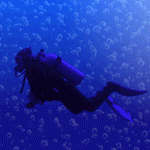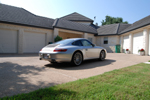Post
by Todd123 » Sun Aug 24, 2008 11:16 pm
Just to explain a little of what your results actually mean..
When it says you are on a pressure of 12, that is in centimeters of water pressure units. (hot mmHg or PSI). It is commonly put as 12cwp. Basically a normal CPAP device will have a pressure range of 5cwp to 20cwp. The pressure someone will need depends on their individual severity. The more often a persons airway is obstructing, or the longer its obstructing for, the higher pressure they will need. The basic principle behind the CPAP(continuous positive air pressure) device is that air is pulled in from the room, and sent through the hose and nasal mask at a higher pressure where it enters your airway and exerts an outward force - holding your airway open. Now, your stats were the following: 62 times per hour your airway was obstructing, 37 times there were arousals from sleep associated with these obstructions, the oxygen level of your blood went as low as 66% due to these airway obstructions when breathing becomes limited (it should stay above 90% at all times sleep or wake), and your heart rate maintained a fairly rapid rate of 77% because of the work it was having to do as a result of your desaturated blood oxygen level. Now, the "62" number is usually what we call your "AHI" or your "RDI". AHI= Apnea/Hypopnea Index...RDI= Respiratory Disturbance Index. Basically for most purposes these acronyms represent the same thing...how many times your airway was closing off per hour..whether because of complete airway obstructions that lasted 10seconds or longer in duration (Apneas) or complete obstructions of shorter duration (Hypopneas) or even because of partial obstructions where there was some airflow but it was very limited. An AHI of 62 is considered severe sleep apnea since anything above 45-50 respiratory events per hour is labeled as severe. 20-45 is moderate, and 10-20 is mild. Now, the "37" number represents how many times per hour you were experiencing arousals from sleep due to these 62 respiratory disturbances. As a person falls asleep at night, they progress through stages of sleep. Stage 1,2,3,4 and then a 5th stage of sleep called REM (rapid eye movement) sleep. Each stage is progessively deeper, and depending on our age, we are to spend an approximated time of sleep in each of those stages before entering REM sleep. REM sleep is our deepest stage of sleep (its where we dream) and it is where we obtain our REST and REJUVENATION for the next day. A normal adult (below the age of about 60 where our deep sleep becomes shorter in duration) should spend about 20-25% of their total nights sleep in REM sleep. When a person has sleep apnea, this architecture of sleep staging is interrupted constantly throughout the night. As one is progressing through these stages of sleep, they will experience an airway disturbance. As a result, the brain panics (mainly because of the fact that when we stop breathing, or 02 levels go down) and wakes us up to regain control of our airway. Even if we aren't waken up to the point of being bright eyed and bushy tailed gasping for air or choking, our brain is taken back from a deeper stage of sleep to a lighter stage of sleep..(ex. stage 3 to stage 1). As one can see, if this is happening constantly (or in your case..37 times an hour..once or twice every two minutes) its very difficult to initiate or maintain a deep sleep becuase we are constantly being interrupted in order to re-open our airway to breathe properly. So, as a result... someone with sleep apnea feels excessive sleepiness throughout their day...fatigue, sluggishness, depresssion, all sorts of things because they are never obtaining a DEEP SLEEP during the night.
The dangerous part of sleep apnea (besides the obvious feeling crappy during the day) is the 02 desaturations. Common sense tells us that if we stop breathing, we obviously aren't getting enough oxygen. This happens at night every time our airway obstructs....the oxygen levels in our blood decrease. This is very dangerous because it puts much uneeded stress on our hearts. As we know, our heart is the organ that pumps oxygenated blood out to the rest of our body. If our blood has much less oxygen in it than it should, then our heart has to work overtime (beat harder and faster) to do its job. Having to do this 6-8 hours a night puts our hearts at risk to be stressing itself for basically 1/3 of its existence. Research and study has made a strong correlation between Sleep Apnea and heart failure, heart arrythmias and such. A common scenario for many people with severe sleep apnea is the following: They fall asleep, start experiencing apneas- their 02 levels desaturate to dangerously low levels..(anything below about 65 is considered dangerous because it can cause sudden heart attacks). Because of this low 02 level, the heart starts beating like crazy to get 02 out to the body....it gets into some rhythm it can't escape from and bam...it goes into arrest. Now, this obviously doesnt happen to everyone, but it happens to more people than we like to think. Many people die in their sleep, and many people die of heart attacks... especially older people (who are more likely to suffer from sleep apnea since is a progressive disorder...meaning it gets worse as we get older). Think about it... USE YOUR CPAP MACHINE, not only will it make you feel better, it could SAVE your LIFE.
Now, the reason your CPAP helps you so much is because of what I touched on at the beginning. It holds the airway open. It doesnt nessecarily "help" you breath (unless your on a bipap machine with a backup breath rate...these types of machines are needed for pt's that have trouble remembering to breath during the night, not because they are 'obstructing'), it just holds the airway open allowing your body to work naturally and breath properly. When the airway is help open like it should be, our body begins naturally enting and staying in deep sleep like it should. Our oxygen levels also stay high and remain high throughout the night. The CPAP eliminates 99.9% percent of ALL airway obstructions, and can help us sleep like we've never slept before.
Ok, well hopefully that was some useful information to some of you!
I'm a registered sleep technologist with a bio degree. I've been working in the sleep field (clinical and business side of it) for about 6-7 years now. I love helping people feel better and watching their lives change due to getting a good nights rest!!


















